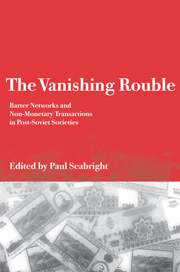Book contents
- Frontmatter
- Contents
- List of figures
- List of tables
- List of boxes
- Preface
- List of contributors
- Introduction: barter networks and ‘information islands’
- I Theory
- II Large-scale empirical studies
- III Ethnography
- 10 How is barter done? The social relations of barter in provincial Russia
- 11 Shadow barter: economic necessity or economic crime?
- 12 Surrogate currencies and the ‘wild market’ in Central Siberia
- 13 Bear skins and macaroni: the social life of things at the margins of a Siberian state collective
- Conclusion: what is to be done?
- Index
11 - Shadow barter: economic necessity or economic crime?
Published online by Cambridge University Press: 05 May 2010
- Frontmatter
- Contents
- List of figures
- List of tables
- List of boxes
- Preface
- List of contributors
- Introduction: barter networks and ‘information islands’
- I Theory
- II Large-scale empirical studies
- III Ethnography
- 10 How is barter done? The social relations of barter in provincial Russia
- 11 Shadow barter: economic necessity or economic crime?
- 12 Surrogate currencies and the ‘wild market’ in Central Siberia
- 13 Bear skins and macaroni: the social life of things at the margins of a Siberian state collective
- Conclusion: what is to be done?
- Index
Summary
Introduction
This chapter analyses barter practices in a micro perspective. It offers a graphic description of the technical aspects of barter chains, discusses possibilities of shadow production and assesses the transaction costs of tax evasion for a small provincial firm trading almost entirely in barter. Most importantly, the chapter illustrates the range of shadow practices deployed in barter operations–such as using double books and fake documents for defrauding tax authorities, ‘laundering’ cash in barter trans- actions, dealing with criminalised businesses, giving and receiving bribes, gifts, favours, etc. These practices seem logical under the circumstances, but look absurd in purely economic terms and are often criminal in purely legal terms.
The detailed ethnography presented below suggests that those exercising them often view these shadow practices in terms of economic necessity. At the same time, most of the shadow economy's activities qualify as economic fraud. A discourse of economic necessity, referring to everything from ineffective legislation to the inevitable pressures of the production cycle, leads to an acceptance of shadow practices, while the self-interested nature of such ‘economic necessity’ – an important factor supporting the existence of barter – remains unnoticed. I will illustrate in detail how blurred the logic of necessity and the logic of personal interest have become, and how much both of them are tied to, merged with and mediated by, personal contacts.
- Type
- Chapter
- Information
- The Vanishing RoubleBarter Networks and Non-Monetary Transactions in Post-Soviet Societies, pp. 298 - 317Publisher: Cambridge University PressPrint publication year: 2000
- 2
- Cited by



